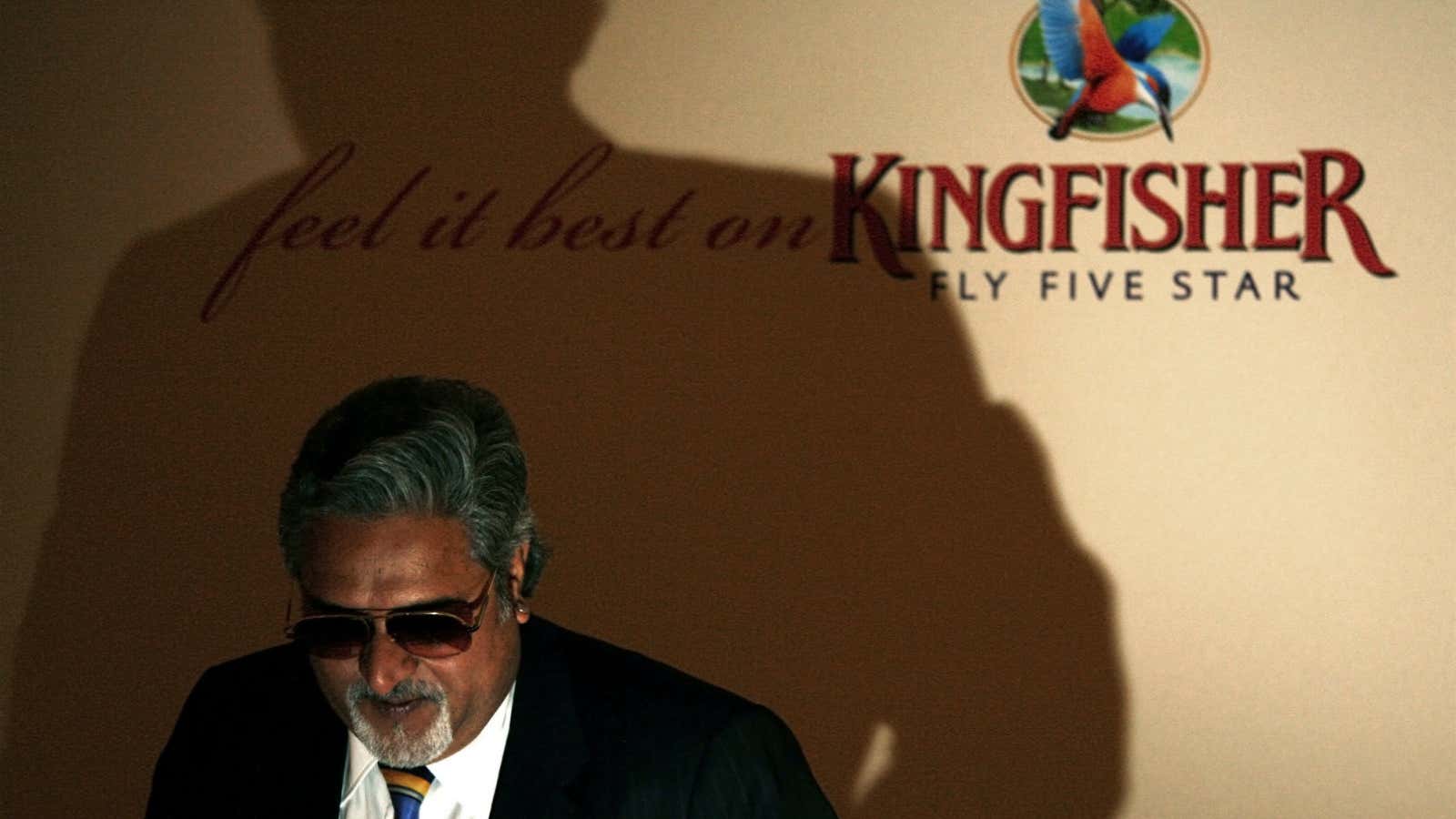Does Vijay Mallya’s extradition mean all his debts will be cleared?
India’s most talked-about defaulter was arrested on April 18 in London by Scotland Yard, but was out on bail within hours. The arrest was the first step in extraditing Mallya who had fled the country on March 02, 2016, after banks took a legal course to recover dues from Kingfisher Airlines, his now grounded carrier.
In 2012, following years of mismanagement, the airline ceased operations. Kingfisher owes over Rs9,000 crore to a clutch of banks. Mallya and the alcohol company he owned then, United Breweries, had stood as guarantors for some of these loans. Many banks have declared him a wilful defaulter—someone who has the ability to repay loans but doesn’t. Apart from dues to banks, Mallya’s company also owes Rs300 crore in salaries to some 3,000 employees.
Even if—and it’s a big if—Mallya is brought back, experts say the road to recovering their dues will be a long and tough one for banks and employees .
For one, Kingfisher doesn’t have many assets that can be liquidated to repay all the dues. The remaining dues will have to be recovered from Mallya’s personal assets. But this can only be done if it is proved that Mallya indulged in fraud or other illegal activity, according to Sitesh Mukherjee, a partner at law firm Trilegal. “Mallya coming back does not equal to money coming back,” Mukherjee said.
In a conversation with Quartz, he described the possible scenarios that could follow Mallya’s extradition:
Banks will need to prove wrongful activity
“Even if he gets back or is brought back to India, in order for his personal assets and properties to be (made) answerable for loans taken by Kingfisher, they (banks) will have to prove that he was fraudulent in his conduct, or that he diverted funds. (They have to prove) that he misused his position as the director and the management of Kingfisher Airlines unjustly and illegally to enrich himself,” Mukherjee explained. Mere charges of mismanagement aren’t sufficient, he said.
There has to be evidence of illegal conduct, which caused losses to the company, while personally enriching himself, according to Mukherjee. “There should be wrongful gain or some other breach of trust, not merely a charge of poor decision making.”
What happens to employees’ dues?
Apart from banks, employees of Mallya’s now defunct airline, too, expect his extradition to help them get their dues. But again, it depends purely on the company’s assets. “Just as in the case of the banks, if Mallya is proved to have caused wrongful loss to the company, or fraudulently caused loss of funds, only then will his personal assets also be liable,” Mukherjee said. Without proof of fraud, Mallya’s personal assets can’t be used to clear employee dues either, he added.
What charges will he be tried for?
Typically, offences for which a fugitive is tried depend on the conditions of extradition, Mukherjee explained. Mallya was “arrested on behalf of the Indian authorities in relation to accusations of fraud,” the London Metropolitan Police’s extradition unit said on April 18. If there is no condition for extradition, then India can charge Mallya for any offence. However, if it involves specific conditions, authorities will be bound by them, Mukherjee said.
Currently, there are various cases against Mallya in India: a Delhi court has issued a non-bailable warrant (NBW) alleging him to have evaded summons in a case of Foreign Exchange Regulation Act violation, a Central Bureau of Investigation (CBI) court has another NBW for loan default, while the country’s debt recovery tribunal has ordered banks to begin the recovery of loans.
What if Mallya says he has no personal wealth?
If banks and authorities successfully prove that Mallya was involved in fraudulent activities, then he may be asked to clear his debts and dues from his personal funds. However, chances are that Mallya will claim to have no assets or funds. In this case, “asset tracing can be used to see if he has fraudulently transferred his assets to third-parties,” said Mukherjee. If he really has no money, he will have to go to a civil prison, Mukherjee added.
In 2007, the high-flying business tycoon was worth $1.5 billion. By 2013, his net worth steadily fell to $750 million.
His current net worth? Only Mallya knows!
